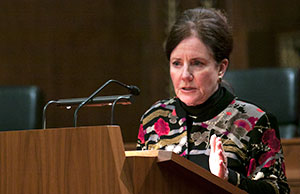U.S. Diplomat Hopeful that Development of the Rule of Law in Myanmar Will Lead to Foreign Investment, Economic Growth

Priscilla A. Clapp, former U.S. diplomat in Myanmar, speaks about the Southeast Asian country's transition to a democratic system of government at the Ohio Supreme Court's Forum on the Law lecture series.

Priscilla A. Clapp, former U.S. diplomat in Myanmar, speaks about the Southeast Asian country's transition to a democratic system of government at the Ohio Supreme Court's Forum on the Law lecture series.
The Southeast Asian country of Myanmar has the strategic location, natural resources and other advantages to become a thriving, developed country, but first it must develop a legal system that can support stability and investment.
VIEW THE COMPLETE PROGRAM ONLINE.
That is the assessment of a former U.S. diplomat in Myanmar who on Tuesday spoke at the Ohio Supreme Court’s Forum on the Law lecture series at the Thomas J. Moyer Ohio Judicial Center.
Priscilla A. Clapp said now that years of economic sanctions have been lifted and the country formerly known as Burma is transitioning to a democratic system of government, U.S. companies are eager to invest in Myanmar, a country about the size of Texas with 53 million people that sits between the two most populace countries on Earth, China and India.
However, she said that since the country ended decades of brutal military rule and held democratic elections in 2010, foreign commercial activity has largely been limited to the marketing of consumer goods as opposed to true investment in sustainable businesses. She said this is because the judicial branch is still viewed as corrupt and dysfunctional both by its own people and prospective foreign investors.
“Western investors do not want to go into an environment that has no rule of law, where they cannot arbitrate disputes,” she said.
Clapp said she is hopeful that current efforts to foster a cultural change and develop the necessary governmental infrastructure to support the rule of law will eventually succeed.
“It’s going to take an awful lot of assistance from the outside, particularly Western societies,” she said. “It’s going to take a long, long time, but they know it. They know that it’s a problem. They want to address it, and I think one thing that will force them to address it right away is the impact that it’s going to have on foreign direct investment.”
While Myanmar “has changed dramatically in the last three years,” Clapp said progress in developing a fair and truly independent judiciary will require a cultural shift at the grass roots level.
“Most people don’t even understand what the rule of law means,” she said. “Many of the people in the remote areas who have been dealt with at the end of a gun barrel think of the legal system there as a function of the security services … that the laws exist to serve the purposes of the security services to allow them to arrest people they don’t like, put them in jail, and so forth.”
With the help of U.S., Japanese and European partners, progress is being made in this area, Clapp said.
Clapp served in the U.S. consulate in Burma for six years; three years as chief of mission. She is currently advising the Asia Society and the United States Institute of Peace’s Rule of Law Center. In addition to her deep understanding of the challenges facing the country, she is well acquainted with the major players, including Myanmar’s opposition leader and Nobel Peace Prize winner Aung San Suu Kyi. Clapp has made a number of appearances on the PBS News Hour, C-SPAN, CNN, and as an op-ed contributor to The Wall Street Journal Asia Edition.
Forum on the Law was established in 2009 by the late Chief Justice Thomas J. Moyer as an ongoing lecture series featuring regional or national speakers who address contemporary or historic legal topics. It is presented by The Ohio State University John Glenn School of Public Affairs, Ohio State Bar Association, Thomas J. Moyer Ohio Judicial Center Foundation, and Supreme Court of Ohio.


